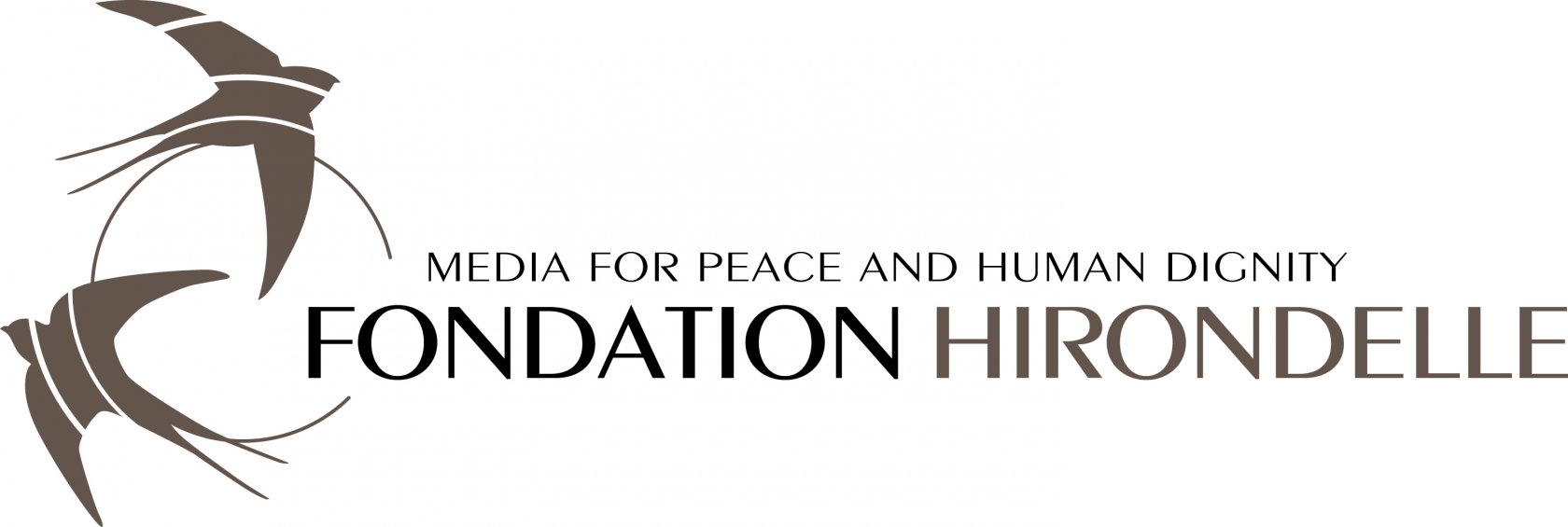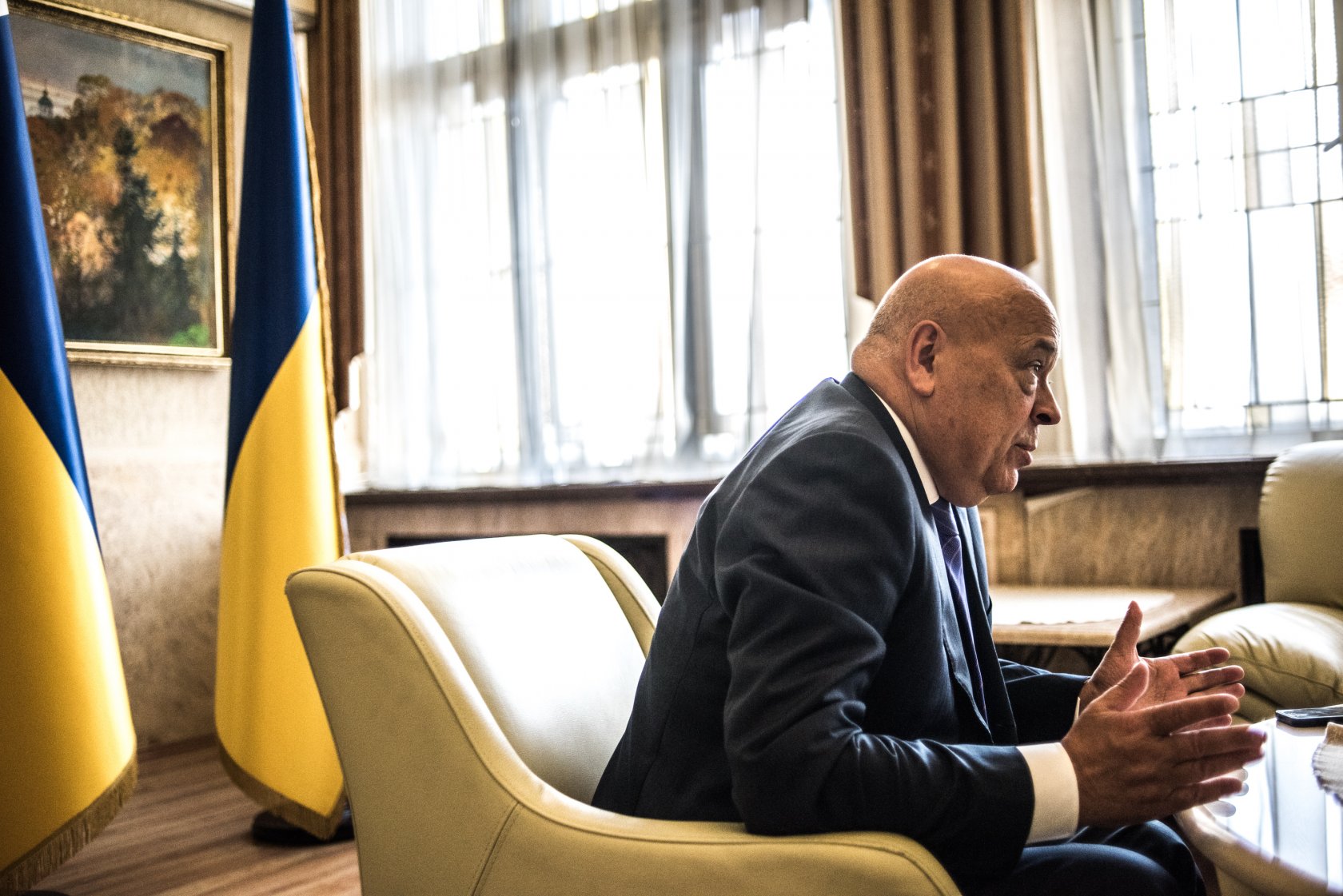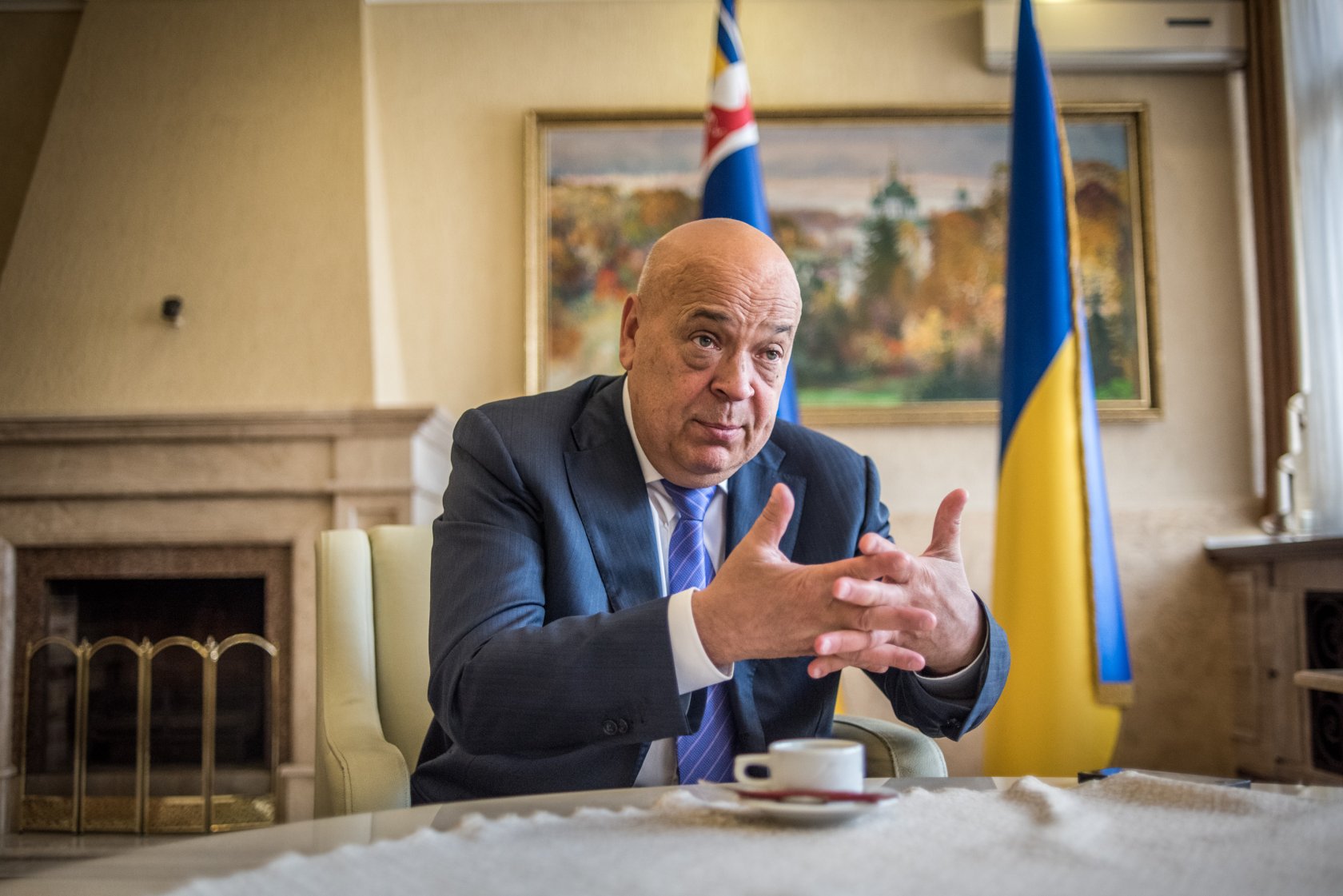Fondation hirondelle // ukraine project
Improving Security in Uzhgorod
The multi-ethnic region of Transcarpathia is still short of funds for decentralization, but the police are already stepping up to fight trafficking
TEXT : Sergiy Polezhaka (With Stephane Siohan) - PHOTO : Sergiy Polezhaka
In Uzhgorod (region of Transcarpathia)
In the small regional capital of Uzhgorod, with its feel of a pretty, sleepy Austro-Hungarian town, people continue to play on state borders, across which lives have always been intertwined in the Carpathian Mountains. "Here everyone earns their living from the borders," says a young man in one of the town's pubs, "even the girls who come on bikes and seem to be strolling innocently under the chestnut trees in the evening!"
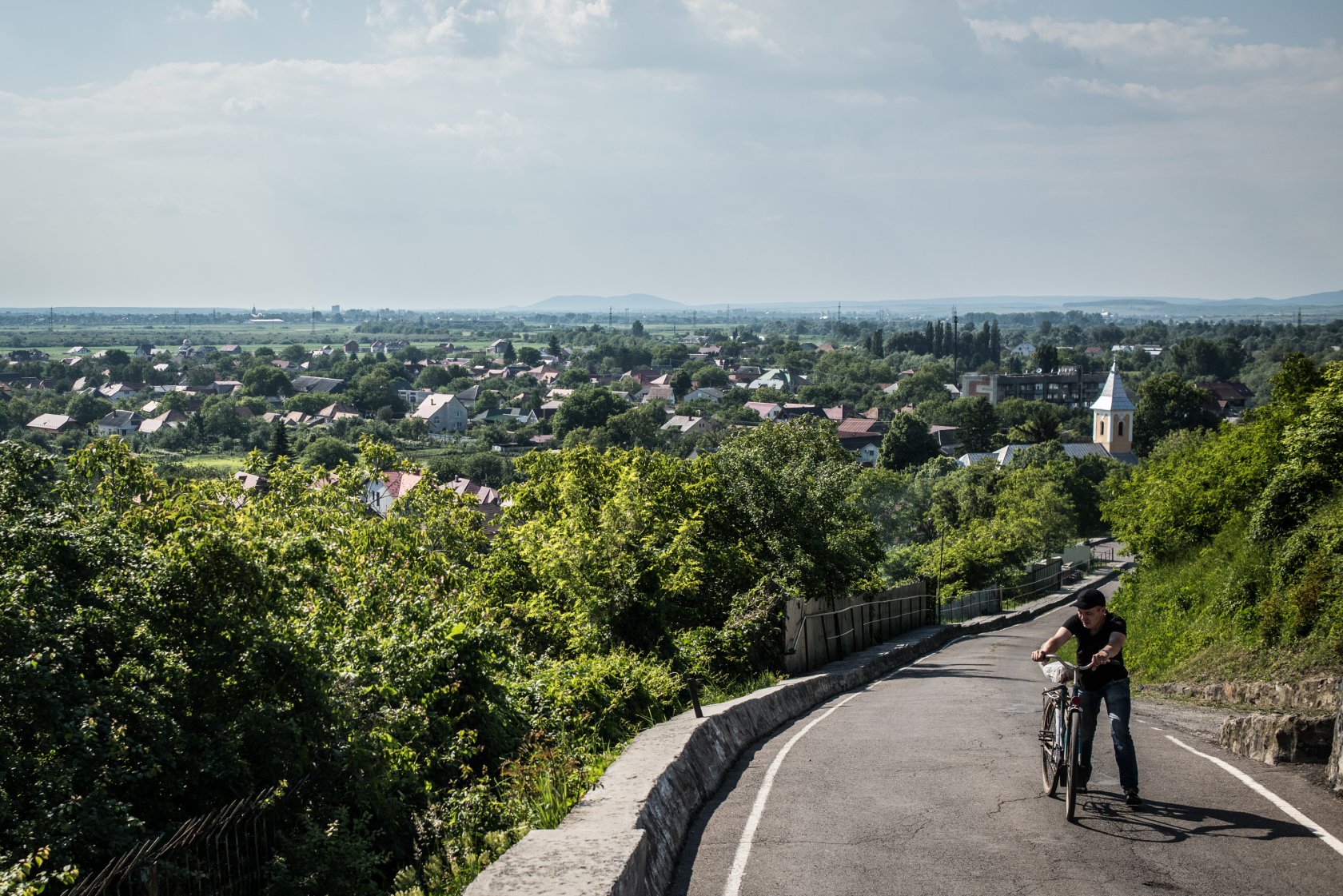
3 kilometers from the center of Mukacheve, one arrives at the border with Slovakia, doorway to the European Union.
Transcarpathia is one of the geographical centres of Europe. It is in any case a unique region in Ukraine. The region's history has always put it on the margins of the empires and states that have formed here. And it was this mountainous western region of the Carpathians that declared itself for two days the second independent Ukrainian republic in 20th century history.
During Soviet times, Uzhgorod, with a population of 115,000, was at the Soviet border with Czechoslovakia and Romania. After the breakup of the Soviet Union and Czechoslovakia, it became the crossroads between Ukraine, Hungary, Slovakia and Romania, and two decades later it has become the gateway to the European Union, isolated from the rest of Ukraine by the Carpathian Mountains.
In the south, some places are majority Hungarian or Romanian speaking. The northern part of the region is also peopled by Rusyns, a specific Ukrainian ethnic group. Because of its diversity and the local supporters maintained by the former Party of Regions of late president Viktor Yanukovych, Kiev has sometimes viewed Transcarpathia as the only potential separatist trouble spot in the west of the country.
During Soviet times, Uzhgorod, with a population of 115,000, was at the Soviet border with Czechoslovakia and Romania. After the breakup of the Soviet Union and Czechoslovakia, it became the crossroads between Ukraine, Hungary, Slovakia and Romania, and two decades later it has become the gateway to the European Union, isolated from the rest of Ukraine by the Carpathian Mountains.
In the south, some places are majority Hungarian or Romanian speaking. The northern part of the region is also peopled by Rusyns, a specific Ukrainian ethnic group. Because of its diversity and the local supporters maintained by the former Party of Regions of late president Viktor Yanukovych, Kiev has sometimes viewed Transcarpathia as the only potential separatist trouble spot in the west of the country.
"Some minority groups want to unite parts of the region with Romania or Slovakia, but they only tend to talk in the papers," says Michael Yemets, an IT developer who comes from the Rusyn minority. He thinks there are several factors that explain why people in Transcarpathia have always wanted to try forms of self-government unknown in the rest of Ukraine.
"We are the only region to have had in the 20th century a short independence when the rest of Ukraine was occupied by Poland and the Soviet Union," continues the young man, who speaks Ukrainian and Russian on a daily basis. "In addition, we are already citizens of Europe! From Uzhgorod, it is easier to go to Vienna, Prague or Bratislava than Kiev, and that creates a certain mentality."
A waiver system grants visas to people who live within 15 kilometers of the border. "For them, it is possible to move freely in the border regions of Slovakia and Hungary," explains Michael. "Officially we are not allowed to go to Budapest, Bratislava or Vienna, but people manage to bend the law to do business." The young man thinks people in this region are "more flexible. They have always adapted and know how to organize themselves."
"We are the only region to have had in the 20th century a short independence when the rest of Ukraine was occupied by Poland and the Soviet Union," continues the young man, who speaks Ukrainian and Russian on a daily basis. "In addition, we are already citizens of Europe! From Uzhgorod, it is easier to go to Vienna, Prague or Bratislava than Kiev, and that creates a certain mentality."
A waiver system grants visas to people who live within 15 kilometers of the border. "For them, it is possible to move freely in the border regions of Slovakia and Hungary," explains Michael. "Officially we are not allowed to go to Budapest, Bratislava or Vienna, but people manage to bend the law to do business." The young man thinks people in this region are "more flexible. They have always adapted and know how to organize themselves."
"In Uzhgorod, we are already citizens of Europe"
— Michael, citizen of Uzhgorod
— Michael, citizen of Uzhgorod
That is why, when the decentralization law was passed in 2015, the mountain villages quickly took it up and formed dynamic communities in a way that was quite natural, counting on pooling their resources to get better yields from their activities: agriculture, sales of fruit and vegetables, trade in local crafts and so on. In the main towns, however, the oblast (province) sorely lacks funds and faces serious challenges.
First of all, cross-border trade. Many families earn their living from it, as reflected in the cars you see on the road. In the center of Uzhgorod there are as many Polish and especially Slovak registration plates as Ukrainian, and for good reason. A second-hand Volkswagen that would cost 8,000 Euros in Ukraine including tax can be negotiated for 2,000 Euros from dealers in Bratislava.
First of all, cross-border trade. Many families earn their living from it, as reflected in the cars you see on the road. In the center of Uzhgorod there are as many Polish and especially Slovak registration plates as Ukrainian, and for good reason. A second-hand Volkswagen that would cost 8,000 Euros in Ukraine including tax can be negotiated for 2,000 Euros from dealers in Bratislava.
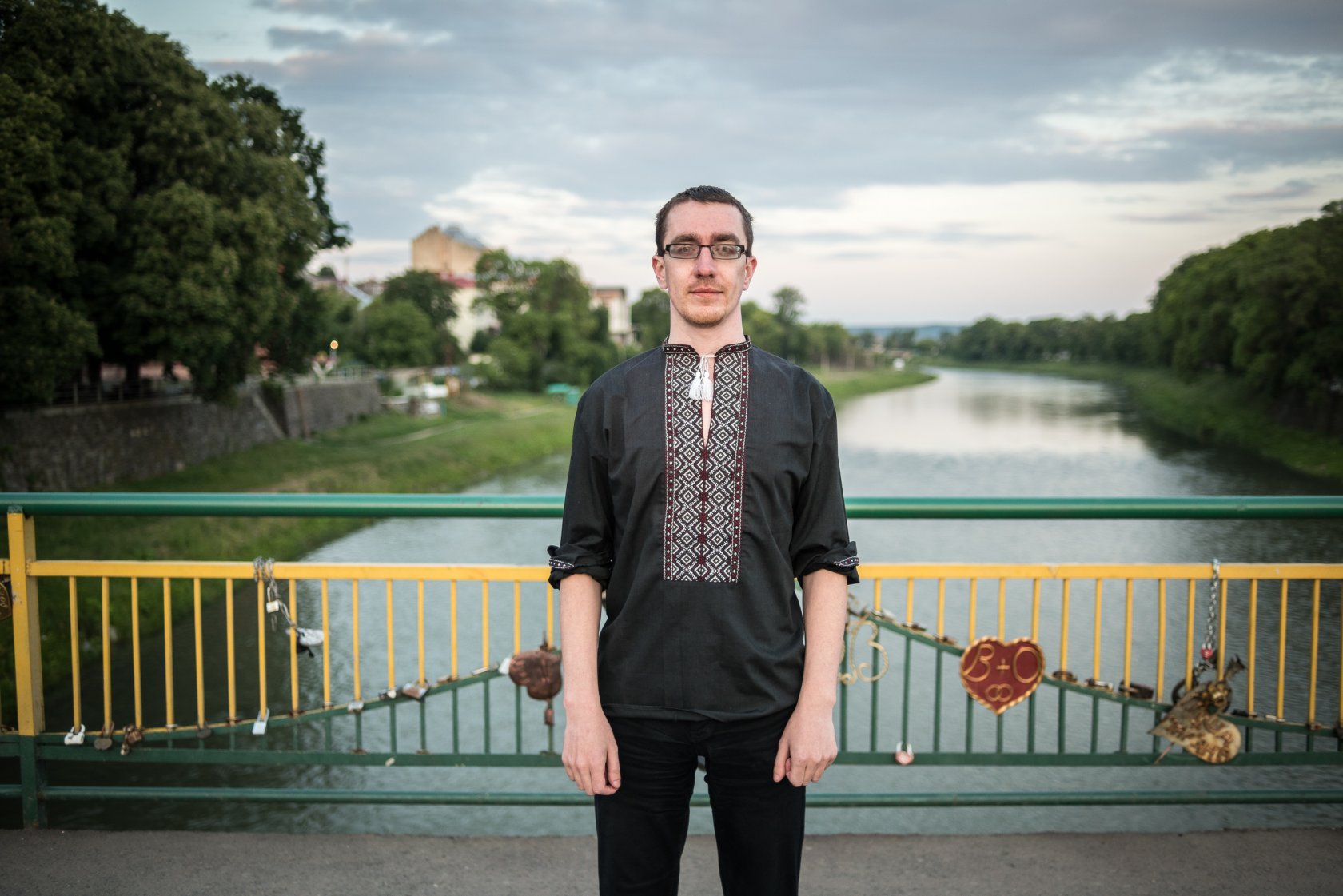
Michael Yemets, an IT developer, comes from the Rusyn ethnic minority. His grandmother came from Siberia, he speaks Russian in his family, Ukrainian in daily life, in a town marked by its Hungarian heritage.
But this trade also has criminal aspects. Located three kilometers from Slovakia, 30 from Hungary, 60 from Romania and 100 from Poland, the outskirts of Uzhgorod have turned into a hub of illicit cigarette, alcohol and wood trafficking. "All local politicians have made money through this trafficking," Michael explains. Certain traffickers have also struck alliances of convenience with paramilitary groups.
To deal with these challenges, Petro Porochenko named a strong man as governor of this region in 2015. Hennadiy Moskal, 50 years old, was up until then the governor of the region of Lugansk (under Ukrainian control), during the height of the fighting. There he gained national fame and the president named him to bring order to Transcarpathia, but also to turn it into a laboratory for regional decentralization.
To deal with these challenges, Petro Porochenko named a strong man as governor of this region in 2015. Hennadiy Moskal, 50 years old, was up until then the governor of the region of Lugansk (under Ukrainian control), during the height of the fighting. There he gained national fame and the president named him to bring order to Transcarpathia, but also to turn it into a laboratory for regional decentralization.
"The decentralization process isn't slow;
it doesn't exist."
— Hennadiy Moskal, Governor
it doesn't exist."
— Hennadiy Moskal, Governor
"Decentralization? I have enough money in my budget to do a bit of work on schools and to renovate public parks," rants Hennadiy Moskal, who received us in his office. The governor never received the resources necessary for his mission and in May 2016 he tried to resign, before the president himself convinced him to stay.
"The first thing that I did, in terms of decentralization, was to ask for governmental departments, such as public works or forest management, to report to the regional administration, and not the central state," he explained. "Before the elections, everyone was promising to put an end to the patterns of corruption that came out of the Yanukovych regime, but the system has resisted, bribes as well, and no one has the intention of putting an end to it."
"The first thing that I did, in terms of decentralization, was to ask for governmental departments, such as public works or forest management, to report to the regional administration, and not the central state," he explained. "Before the elections, everyone was promising to put an end to the patterns of corruption that came out of the Yanukovych regime, but the system has resisted, bribes as well, and no one has the intention of putting an end to it."
Hennadiy Moskal, this well-known national figure, takes a sobering yet realistic view of the situation. "We feel the impact of the war on our entire financial situation; it has considerably reduced our budgets for social spending." However, in Uzhgorod, 76 percent of the regional budget is decided in Kiev. "To analyse our water, we have to ask for permission from above," the governor explains, pointing out a vertical system that was accentuated during the Yanukovych regime.
A passionate supporter of decentralization, Hennadiy Moskal remains, however, tempered in his discourse: "decentralization is not federalization," as many pro-Russian groups in the country are pushing for. "Ukraine, a young country, must remain a united country. The federalism that some are advocating for would tear the country to pieces," he believes, while highlighting the need for mentalities to change in Kiev.
A passionate supporter of decentralization, Hennadiy Moskal remains, however, tempered in his discourse: "decentralization is not federalization," as many pro-Russian groups in the country are pushing for. "Ukraine, a young country, must remain a united country. The federalism that some are advocating for would tear the country to pieces," he believes, while highlighting the need for mentalities to change in Kiev.
From the summit of Velikyi Bychkiv, at more than 1,000 meters, one can see the Romanian side of the mountain. Between the two, a porous border.
The story is similar at other levels of government. At the Forest Resources Agency, one of the most important in Uzhgorod, government workers are caught in the middle. "There are still two different systems: on paper, we are under the regional government, but in reality we also depend on Kiev," explains Valeriy Mourga, the Agency's director. "But sooner or later, decentralization will also arrive here."
Further east, in the village of Velikyi Bychkiv, close to the border with Romania, Andriy is the head of the Lesniki, the forest rangers. With his men, he is responsible for managing the forests in the mountains, notably the cutting of big trees. "I oversee an area of 50,000 hectares," he explains, "and 75 percent of the revenue that we make from them goes directly to the state coffers in Kiev, in a completely opaque manner."
Further east, in the village of Velikyi Bychkiv, close to the border with Romania, Andriy is the head of the Lesniki, the forest rangers. With his men, he is responsible for managing the forests in the mountains, notably the cutting of big trees. "I oversee an area of 50,000 hectares," he explains, "and 75 percent of the revenue that we make from them goes directly to the state coffers in Kiev, in a completely opaque manner."
The situation sometimes reaches the absurd. "Our budget is so small that we have to buy our own equipment ourselves, which can sometimes cost thousands of Euros, but at the end, we have to give all money that we make to the state." So sometimes, even amongst state officers, the temptation for smuggling is very strong, and Andriy is furious. Already over 50, he supports the generation that led the Maidan revolution without question.
"Why did we have a revolution in this country? Because people have no trust in the authorities, at all levels, national or local," he says. "The system has never changed, as the Czech Republic and Poland were able to do, who banned all communists from power for ten years. In my opinion, before decentralization, we need a law that prohibits anyone having served under the USSR to be in power, so as to give power to the younger generation."
"Why did we have a revolution in this country? Because people have no trust in the authorities, at all levels, national or local," he says. "The system has never changed, as the Czech Republic and Poland were able to do, who banned all communists from power for ten years. In my opinion, before decentralization, we need a law that prohibits anyone having served under the USSR to be in power, so as to give power to the younger generation."
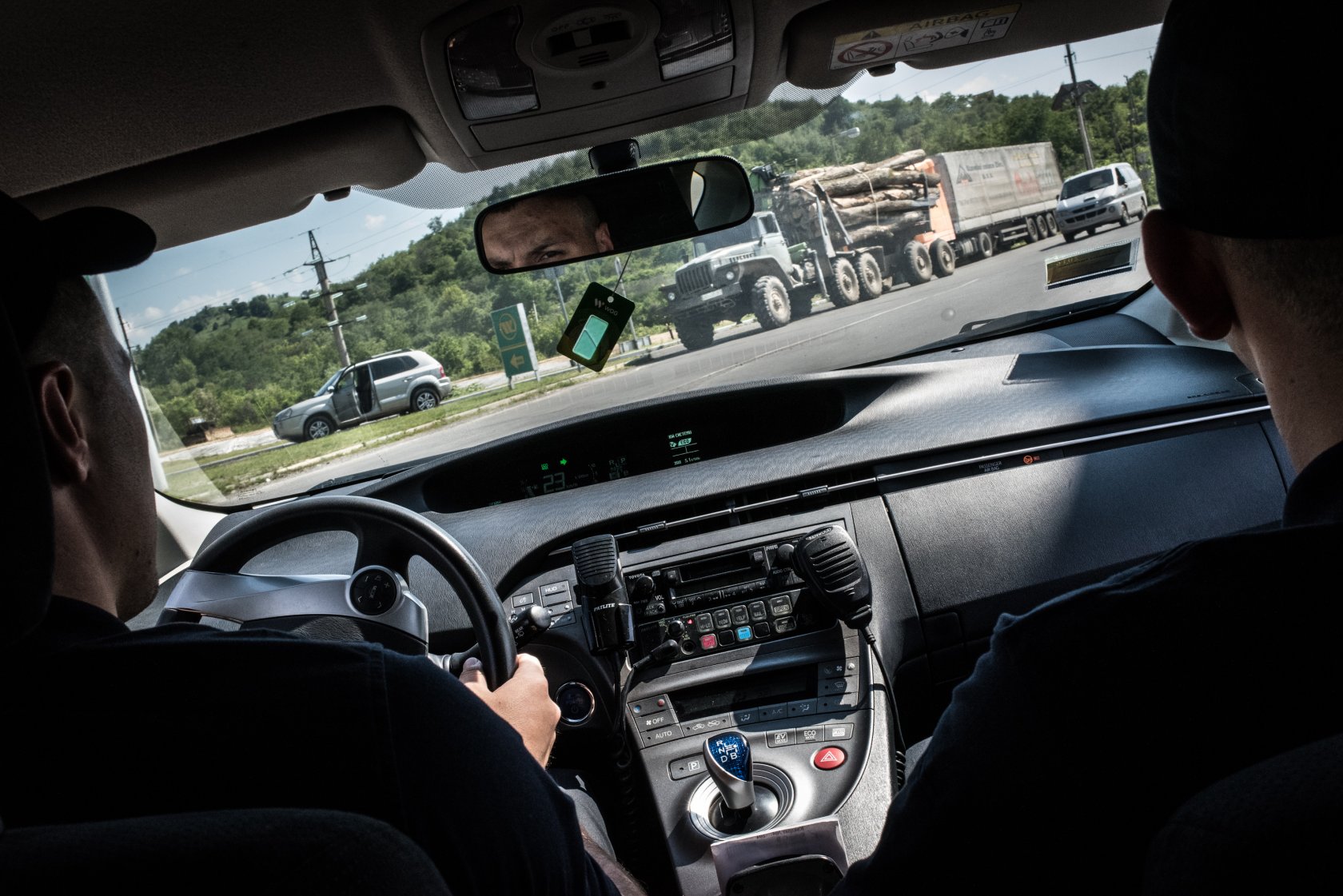
A patrol of the new police in Uzhgorod watch trucks pass by on their way to the border with Slovakia. Wood is one of the most important goods traded on the black market.
If regional decentralization has so far been ineffective, another type of local reform has in fact worked rather well in Transcarpathia: reform of the police. On July 12, 2015, in Mukacheve (population of 85,000), the second largest city in the region, extremely violent clashes broke out between police and members of the ultra-nationalist paramilitary group Pravy Sektor, the latter using a machine gun and a grenade launcher.
This day of violence left 3 dead and 13 injured, and shed light on the flow of arms coming from the front lines in the east, against the backdrop of trans-border cigarette smuggling. The Ministry of the Interior, and led by the young deputy Moustafa Nayyem, an important figure from the Maidan revolution, decided to turn Transcarpathia into one of the first regional laboratories to test police reform.
This day of violence left 3 dead and 13 injured, and shed light on the flow of arms coming from the front lines in the east, against the backdrop of trans-border cigarette smuggling. The Ministry of the Interior, and led by the young deputy Moustafa Nayyem, an important figure from the Maidan revolution, decided to turn Transcarpathia into one of the first regional laboratories to test police reform.
Reform of security forces: an experiment in decentralization close to success
"The shootout motivated us to reform," attests Iouri Martsenyshyn, Uzhgorod's young new police chief. "Since these events, the situation has again become much calmer around arms coming from the conflict in the east; we can't say that crime has increased due to men returning from the Donbass, it's rather the crisis and poverty that has an impact on crime levels."
In November 2015, the new "police" replaced a former "militia", which was despised by the local population. "Before, the bosses would stay in their offices and police officers would go into the street to collect bribes from the population for them," explains Martsenyshyn. "Now, the officials in the offices must do everything in their power to make the police's work easier."
Police officers no longer have to steal in order to buy a car: teams are now provided with brand new Japanese vehicles. "Instead of stopping people to get a bribe out of them, we use megaphones to warn motorists of potential offenses," says Yevguen, Iouri's deputy. "It's a much softer approach."
In November 2015, the new "police" replaced a former "militia", which was despised by the local population. "Before, the bosses would stay in their offices and police officers would go into the street to collect bribes from the population for them," explains Martsenyshyn. "Now, the officials in the offices must do everything in their power to make the police's work easier."
Police officers no longer have to steal in order to buy a car: teams are now provided with brand new Japanese vehicles. "Instead of stopping people to get a bribe out of them, we use megaphones to warn motorists of potential offenses," says Yevguen, Iouri's deputy. "It's a much softer approach."
Now, even for officer and trainer positions, one cannot be more than 35 years old! "Many young people had quit, but some have come back to join the new police force," Martsenyshyn continues. "This is my case: I worked for 7 years in the militia, and not once did someone thank me. Since last year, it's been much easier, people come up to us all the time!"
Yet much remains to be done, and once again the relationship between Kiev and the regions is at the center of the problem. "There is no clear distribution of power between jurisdictions, people do not understand what the police can or cannot do," Yevgen points out. "Stopping a big fish guilty of known criminal acts or corruption is impossible," he easily admits.
Yet much remains to be done, and once again the relationship between Kiev and the regions is at the center of the problem. "There is no clear distribution of power between jurisdictions, people do not understand what the police can or cannot do," Yevgen points out. "Stopping a big fish guilty of known criminal acts or corruption is impossible," he easily admits.
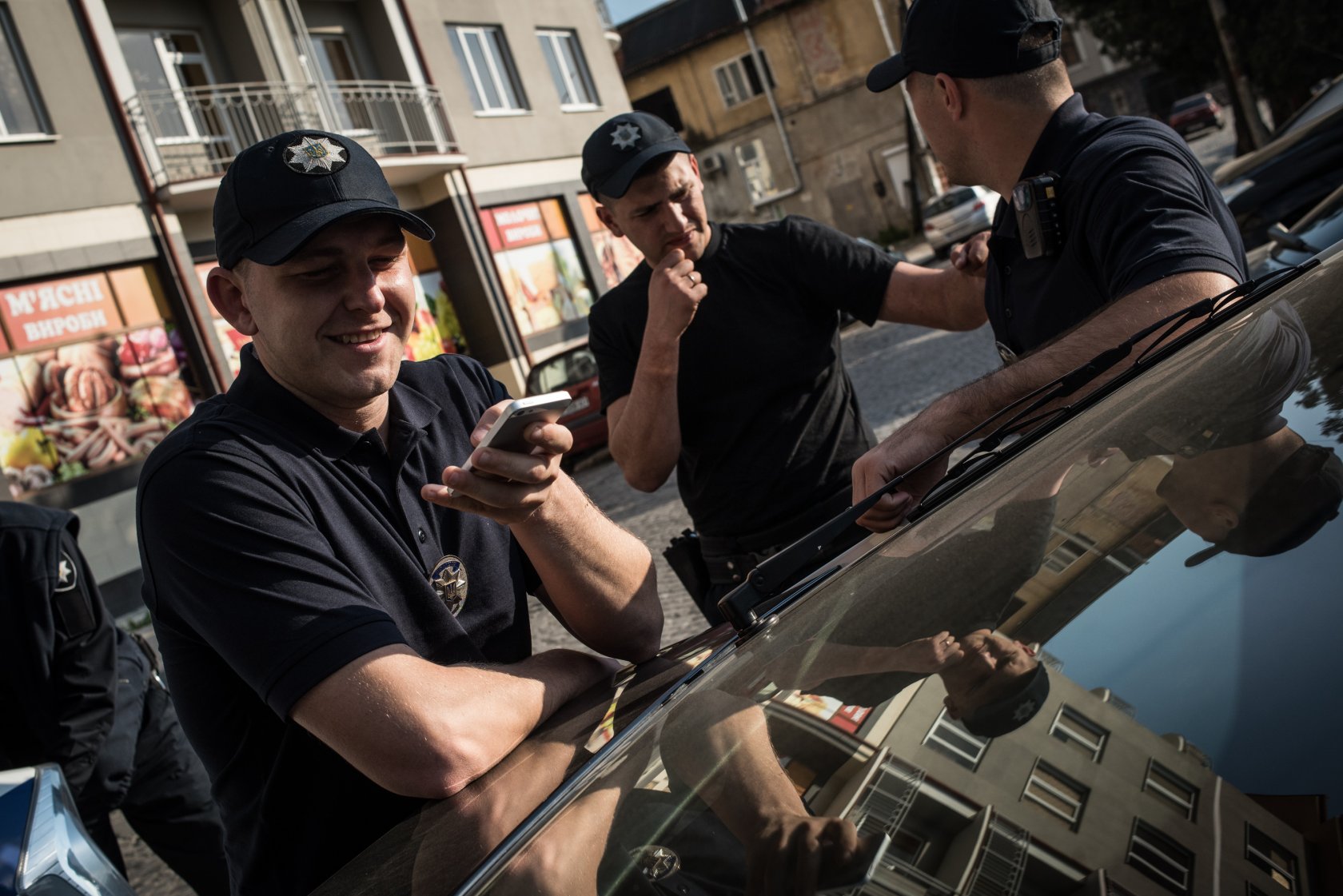
Since 2015, all new police recruits have to be under the age of 35. On a daily basis, many of them use social networks, including Facebook, to communicate directly with the population.
All arrest warrants must be signed off by the regional prosecutor. However, this person is appointed by Ukraine's general state prosecutor, who is in turn appointed by the country's president. For the police in Uzhgorod, who have come to enjoy their improved image amongst the population, the risk is to be limited to "picking up drunks in the streets," while the logical next step is to reform the justice system and the prosecutor's office by giving more power to the bottom and less to the center.
